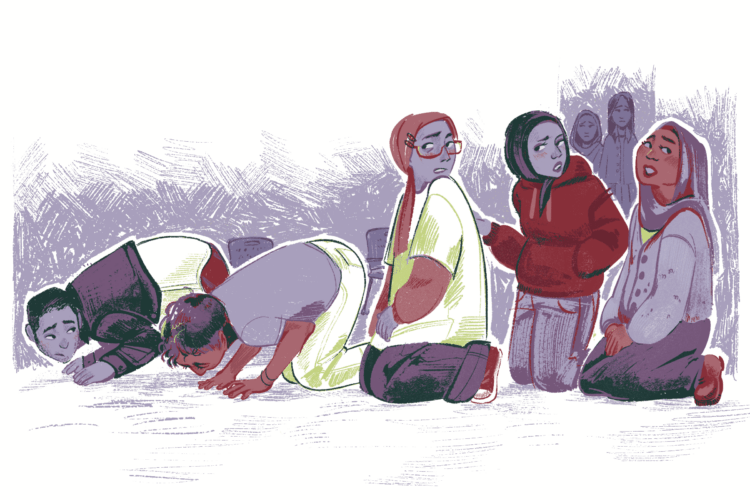
Correction: Starting Feb 28, Handcut will have suhoor grab and go packs available for pre-order.
The text of this article was read aloud and recorded for your greater accessibility and viewing pleasure:
Audio voiced by Marium Asif and recorded and edited by Gren Bee.
According to the Diversity, Equity, and Inclusion Office at the School of the Art Institute of Chicago, two designated spaces exist on campus for quiet reflection and prayer: the basement of the MacLean Center and the Cultural Oasis in the Sullivan Center. However, for many Muslim students, these spaces fail to meet religious needs.
“The door to the Cultural Oasis is glass, so there’s no privacy. The room is structured with tables and couches everywhere, so there’s no space to pray,” said Israa Darwich (MFAW 2025). Darwich continued, “Don’t get me wrong, it’s a welcoming place for people to relax and hang out, but it’s not ideal for prayer. The nap room is constantly occupied. Prayer is supposed to be private, comfortable, and a place for you to be vulnerable.”
Darwich had never seen nor heard of the MacLean basement space, a sentiment echoed by Fatima Alfuraish (BFA 26), and Abdullah Alghamdi (FVNMA 25). Darwich said that she has prayed at home and has seen students praying in isolated hallways or tucked into library corners.
“Neither of those are ideal,” Darwich said.
Alfuraish shared these concerns. “I don’t have a private place to pray. Most of my classes are back-to-back, and all the classrooms are full. I end up praying in corridors, and it’s never comfortable,” she said. “During Ramadan, we struggle even more. Our class schedules don’t always align with prayer times, and we don’t have access to appropriate spaces.”
Alghamdi, the President of the Saudi Student Association, described the Cultural Oasis as “a small room that’s often noisy and occupied by students playing music or socializing.” For this reason, he and many others have turned to alternative spaces and empty classrooms.
“I look for isolated spaces, somewhere away from distractions,” Alghamdi said. “That’s my No. 1 concern.”
When Muslim students have raised concerns about prayer accommodations, some feel their requests have been met with insufficient action. Alghamdi said that when members of the Saudi Student Association inquired with the Disability and Learning Resource Center about better accommodations, they were only given a list of existing spaces rather than actionable solutions.
“All we got were suggestions, not actual help,” Alghamdi said. “We can find our own alternatives, but if the school isn’t going to provide meaningful support, then asking doesn’t feel worth it.”
As Ramadan approaches, the same issues that affected Muslim students last year remain unresolved. Prayer space limitations persist, and dining options are a major concern. The campus cafe closes before iftar, the breaking of daily fast, leaving students with vending machine snacks as their only option.
To cope, Alghamdi has adjusted his fasting schedule. “For the past two years, I wake up before sunrise and stay up all day, or I eat suhoor [pre fast meal] as dinner, sleep around 1 a.m. and wait until maghrib [dusk] the next day to eat again,” he said. He added that some professors have been accommodating, shifting break times to coincide with sunset prayers, but it often falls on students to explain their needs.
Despite the difficulties, Alghamdi acknowledged that student government and advisors have been more supportive than he expected. “We sometimes worry about cultural differences causing pushback, but instead, we’re met with genuine curiosity and easy approvals,” he said.
At the time this article was written, the Saudi Student Association was focused on planning a large-scale event for Saudi Founding Day on Feb. 22, which left little bandwidth for Ramadan-specific initiatives. However, collaborations with the Arab Culture Club and the South Asian Society are in progress to make the holy month more accommodating for Muslim students.
The president’s office directed F Newsmagazine to speak to the DEI office about these issues.
The DEI office at SAIC has been actively working to address concerns regarding interfaith accommodations, particularly as Ramadan approaches. DEI representatives outlined their ongoing efforts, limits, and long-term plans to create more inclusive spaces for religious observance on campus.
“We want to make sure that students have spaces where they can practice their faith comfortably,” said Sekile Nzinga, vice president of DEI. “We recognize that the current options are not ideal, and we’re working on both short-term and long-term solutions.”
In response to the lack of prayer spaces, the Instructional Resources and Facilities Management, Student Life, and DEI offices have been searching for appropriate locations in various buildings across campus in addition to the Cultural Oasis and a meditation room in the basement of the Maclean Center. DEI is working to secure new spaces including the Movement Room in Maclean and a designated area in the Sharp Building. Despite a thorough search, there has been no space identified that can be used as a prayer space in the 280 building.
“We are trying to find more spaces that can be reserved for prayer and ensure they are accessible and private,” Nzinga added. There are also plans to enhance the suitability of the prayer spaces by adding privacy features such as moving furniture placement and bringing in prayer mats.
Beyond physical spaces, the DEI office is facilitating communal support for Muslim students observing Ramadan.
“We’ll have dates, snacks, and other foods available in key locations,” said Karl Constant, Director for Student Engagement. “In the future, we also want to make sure there are warm halal meals, and we’re working on expanding takeaway options for students who need to eat later in the evening,” he added. The Cultural Oasis will also be stocked with tea, coffee, dates, and light snacks to accommodate students fasting during Ramadan.
A significant challenge the school has encountered is the absence of an officially recognized Muslim student organization at SAIC. While cultural groups such as the Saudi Student Association and the Arab Cultural Club exist, there is no specific group advocating for Muslim students’ needs.
“It’s much easier to engage when there’s a formal organization representing students,” said Nzinga. “That way, we can have structured discussions and make more targeted improvements.” To bridge this gap, the DEI office has been conducting listening sessions throughout the fall to better understand student concerns and encourage direct participation in policy discussions.
The DEI office also acknowledged the broader institutional challenges in accommodating religious diversity. “We don’t have a dedicated interfaith office at SAIC but we are committed to supporting religious and spiritual diversity,” said Constant.
To foster a more supportive campus culture, DEI is launching an educational campaign to inform faculty and staff about Ramadan and religious accommodations. This initiative includes sending out informational materials that explain prayer practices, fasting requirements, and the significance of Ramadan.
“One of the key things we discussed was how to better educate faculty so that they can proactively support our diverse student body,” Nzinga said. “We don’t want students to feel like they have to advocate alone, though it is helpful to hear them voice their needs.”
While the DEI office strives to be as responsive as possible, they acknowledged the need for more structured, permanent solutions. “We know that what we’re doing now is just the beginning,” Nzinga said. “But we are listening, we care, and we’re committed to making things better.”
Currently, there are three religious affinity groups on campus: Jewish Voice for Peace, SAIC Hillel, and InterVarsity Christian Fellowship. So far, these groups have not requested specific accommodations or communicated any needs to the DEI office since the team began its work last year. To best assist affinity groups on campus, the DEI office invites students to reach out to Constant, and Samhita Sonti, the Coordinator of Cultural Oasis.
Universities across Chicago have policies that allow them to meet the needs of religious affinity groups.
At the University of Chicago, students have access to multiple prayer spaces, including the Muslim Prayer Room, the Newberger Hillel Center for Jewish students, and the Calvert House for Catholic students. Hyde Park has multiple halal and kosher restaurants that work with the university on their meal plan and the university also directly supports dietary needs by offering halal and kosher dining options on campus. During Ramadan, Muslim students can request meal accommodations such as take-home suhoor and iftar meals.
The University of Illinois – Chicago has dedicated multi-faith prayer and meditation rooms across campus. The dining services provide halal and kosher meal options, and students observing Ramadan can request modified meal plans to accommodate fasting schedules. UIC also allows academic flexibility for religious observances and shares possible accommodation needs with faculty before the religious event happens.
DePaul University provides prayer and meditation spaces on both of its campuses and has weekly activities including a Jummah congregation, an in-house Chaplain for Muslim students, Catholic Mass, and monthly Shabbat services and dinner. DePaul works closely with Jewish and Muslim student groups to ensure adequate meal options during religious holidays. The university acknowledges major religious holidays and encourages faculty to accommodate students who may need time off for observances like Yom Kippur or Eid.
Student Reflections
Abdullah Alghamdi:
It’s a very beautiful and good thing to celebrate, but it usually comes at a time when we’re all sinking in our projects so it’s very good to find company and celebrate the month.
Observing Ramadan in an academic setting is a recent thing for me, and I’ve been making space for this. If anybody asks me for plans that’s what I’m planning to maintain. I want to stay focused on my academics most of the time and still celebrate this month and enjoy its possibilities and what it can give me. I want to spend a lot of time reading the Quran and praying. Without letting the hustle of my life pull me down. It’s a difficult thing to do during Ramadan, and that’s what I’m hoping to do.
Jannah Sellars:
Ramadan is peace. It’s tuning out the outer world to tune into the inner. It’s sleepy suhoors (the pre-dawn meal) and communal Iftars (the fast breaking meal). It’s reading more Quran, twinkle lights in the living room, and napping at work during lunch break. It’s replacing playlists with prayer, and television with tasbeeh (using prayer beads to count repetitions of short prayers). It’s breaking your fast with dates and milk and making harira (a traditional Moroccan soup commonly eaten during Ramadan) with mama. It’s worldwide solidarity and submission, a constant reminder of our reliance on God, and a taming of our worldly desires in order to achieve spiritual refinement.
Ramadan is the ninth month in the Islamic calendar during which Muslims around the world observe by fasting every day from sunrise to sunset. Ramadan is a special time of deep reflection and spiritual renewal and is followed by Eid al-Fitr, a three-day celebration marking the end of the holy month. It is customary for Muslims to host iftars and spend the month in community with others. Special night prayers, taraweeh, also take place during Ramadan, and many Muslims try to increase their worship and abstain from bad habits. While aspects of Ramadan can be difficult, especially in spaces where Muslims are minorities, it is a truly blessed time that is cherished and beloved by all. Wishing you all a blessed and illuminated month, Ramadan Mubarak!
Marium Asif:
Ramadan is a month of light, nostalgia, spirituality, and community. Part of the reason I’ve been working on this article is because last year I entered ramzan feeling very alone and isolated here, but ended up having a beautiful month with my community I found in the city, and I want every Muslim to feel that way in this month. Ramzan means waking up at 5 a.m., warming up the meal I prepared last night, and chugging five cups of coffee hoping the effects stay in my body for the next 13 hours. Often I forget to hydrate and spend the rest of the day regretting the acidity of the coffee. Ramzan is days spent in a lull and nights that are alive with work, Quran, lights, and chai. Long nights in Qiyaam, sleepovers at the mosque, taraweeh with beautiful qirat and this deep feeling of peace.;’t







